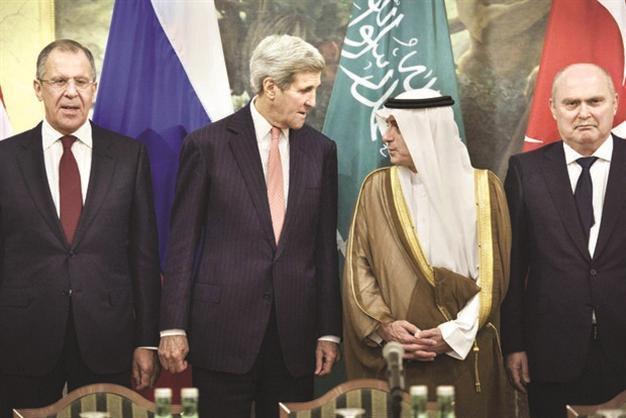International powers seek compromise to end Syria war, start transition
VIENNA

AFP photo
The Syrian government’s biggest international backers and opponents plunged into negotiations on Oct. 30 over a long-sought compromise to help end the four-and-a-half year civil war and potentially ease President Bashar al-Assad out of power.
U.S. Secretary of State John Kerry said he was “hopeful” of finding a path forward.
“I am hopeful that we can find a way forward,” Kerry told reporters, before adding: “It is very difficult.”
In Austria’s capital, Kerry was negotiating with foreign ministers and senior representatives of 18 other countries following a first day of talks with his Turkish, Russian and Saudi Arabian counterparts. Turkish Foreign Minister Feridun Sinirlioğlu represented Ankara in the talks.
The countries involved in the Oct. 30 talks included Iran for the first time, making it the broadest gathering of nations yet to discuss Syria’s future. Another key supporter of al-Assad, Russia, was present, along with many of the U.S.’s most influential Arab and European allies.
Several participants argued that the talks themselves were a sign of progress. But with no end to the war in sight, there was pressure on all sides to begin chipping away at a “political transition” plan that might convince Assad’s government and the vast array of armed rebel groups to stop fighting and allow world powers to focus on their shared commitment to defeat Islamic State of Iraq and the Levant (ISIL).
As the Vienna talks were taking place, the Syrian opposition reported that a government missile barrage killed more than 40 people in a Damascus suburb.
The conflict has claimed more than 250,000 lives and uprooted more than 11 million people since 2011, leading to the growing terrorist threat of ISIL and sparking a refugee crisis throughout Europe.
Al-Assad’s fate was at the center of discussions. The U.S., Saudi Arabia and others have recently tempered their earlier calls for the Syrian president’s immediate ouster and now say he could remain in office for months as part of a transition if he agrees to resign at the end of the process. Russia and Iran are both providing al-Assad with military assistance but say Syria’s leadership should not be dictated by outside forces.
However, both countries have also hinted at greater flexibility in recent weeks.
Western diplomats have spoken of various conversations with their Russian counterparts indicating that the Kremlin is not “wedded” to al-Assad maintaining control of the country, The Associated Press reported.
Russia’s deputy foreign minister, Mikhail Bogdanov, said his country and Saudi Arabia had exchanged lists of opposition groups that should be involved in future peace talks - an important question as those fighting Assad range from al-Qaeda-linked militants to self-styled moderates.
Russian Deputy Foreign Minister Sergei Ryabkov said on Oct. 30, according to Russian news agencies, that Moscow considers the use of U.S. forces without coordination with al-Assad’s government “unacceptable.”
Ryabkov’s statement followed U.S. Defense Secretary Ash Carter saying earlier this week that the U.S. was retooling its strategy in Iraq and Syria and would conduct unilateral ground raids if needed to ISIL militants. The U.S. now has no troops in Syria.
There was no immediate word on any direct exchanges between Shiite-dominated Iran and Sunni-led Saudi Arabia, bitter regional rivals who have waged proxy battles for influence across the Middle East. Saudi Arabia’s al-Jubeir was seated about as far apart from Iranian Foreign Minister Mohammad Javad Zarif as possible.
“Iran does not insist on keeping Assad in power forever,” Iranian Deputy Foreign Minister Amir Abdollahian, a member of Tehran’s delegation, was quoted by Iranian media as saying.
But no one has provided any clear indication of what the transition process might look like and how long it would take - or if either of the Syrian sides would be ready to support such a plan. Al-Assad, a member of Syria’s Alawite minority, won re-election last year in a vote that Western countries called a sham, and his term officially ends in 2021. The Sunni-led opposition wants him out immediately.
Underscoring the search for a compromise, French Foreign Minister Laurent Fabius only said al-Assad should step aside “at one moment or another.” Saudi Foreign Minister Adel al-Jubeir said earlier this week that al-Assad must quit his post “within a specific timeframe.”
Since the start of Syria’s unrest in 2011, al-Assad’s future has been a stumbling block to all efforts aimed at ending the fighting. U.S. President Barack Obama demanded that he leave power only months into the fighting, but Russia resisted the push by blocking attempts at the U.N. to pressure the Syrian leader and insisting that any new government must only be established by mutual consent of both the government and the opposition. That essentially gave al-Assad veto power over his would-be replacements.
Even if the countries do reach an agreement on the fate of al-Assad, it won’t solve everything. Syrians of all stripes will have to figure out how to stop the violence between the army and the many different militant groups and how to share power in a government comprised of such fierce enemies.
Meanwhile, Reuters quoted a senior U.S. official as saying that there could be a new round of international discussions in Vienna as early as next week on finding a political solution to the war.
